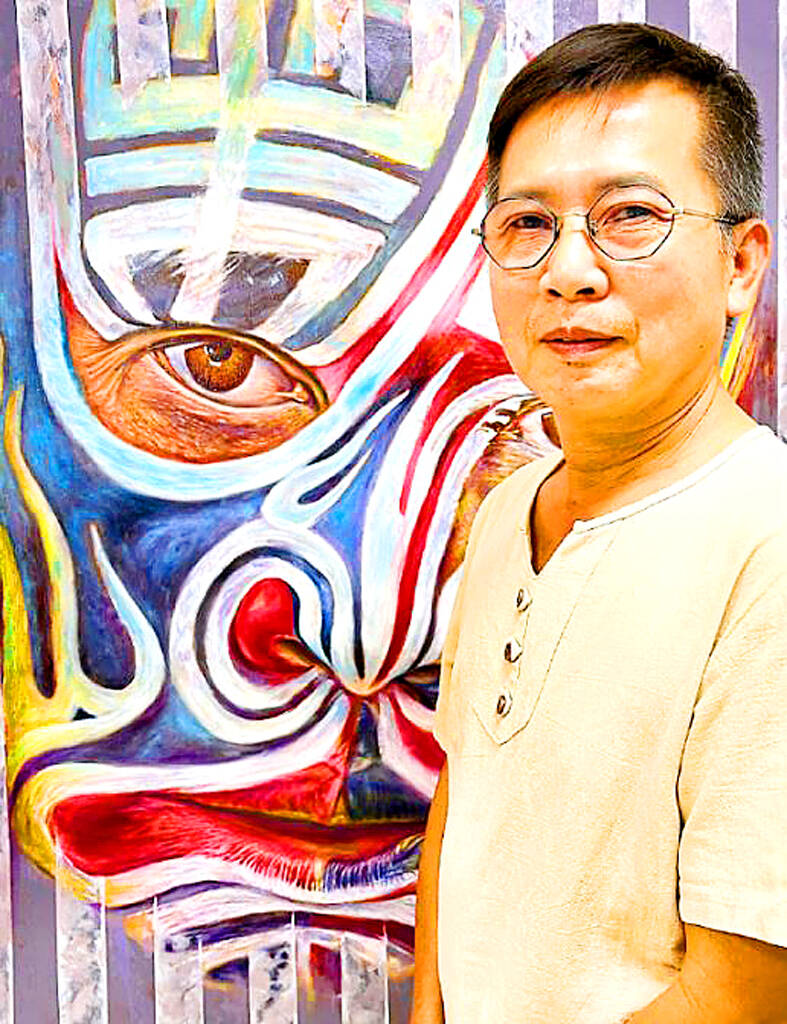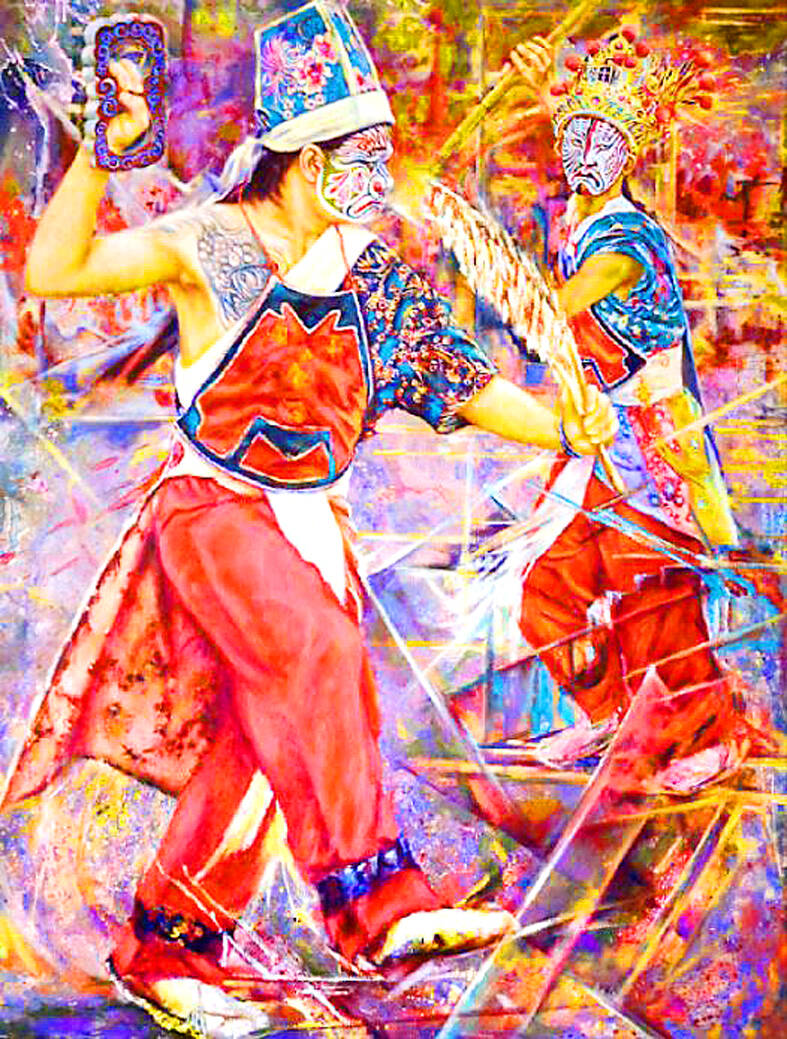Taiwanese art must beat its own path by exploring native culture and lived experiences to stand out on the global stage of fine arts, said Jhuang Jian-yu (莊洊有), an oil painter whose creations revolve around the ceremonial Dance of the Eight Generals.
Born in 1961 to a blue-collar family, Jhuang said he harbored artistic aspirations, but did not have the opportunity to receive a formal fine arts education, as his family elders vehemently opposed his dreams.
Jhuang’s father believed that art did not lead to a career and would beat Jhuang whenever he was caught drawing pictures, he said, adding that he learned to doodle furtively.

Photo: Kao I-fen, Taipei Times
By the age of 16, Jhuang began working to support his family after failing to graduate from the electronic engineering program at his vocational high school, as he was not interested in the subject and had no money to pay for tuition, he said.
For the next two decades, Jhuang worked and raised a family of his own while reading literature and philosophy in his free time, he said.
He picked up the brush in 2000 after the last of the family elders he supported passed away, Jhuang said, adding that he painted mainly landscapes and portraits during that time.

Photo courtesy of Jhuang Jian-yu
In 2007, Jhuang had a conversation with renowned ink painter Hung Ken-shan (洪根深) in which the latter told him that his paintings did not possess the originality that distinguishes an artist from their peers, he said.
Realizing that creating landscapes and portraits which any other artist can duplicate is futile, Jhuang burned his old paintings and then immersed himself in Western art history and theory, he said.
Studying the rise of new artistic styles in history gave him an insight: He had to look into his native culture if he wanted to create paintings that bear an unmistakable personal stamp, Jhuang said.
While Jhuang searched for inspiration, he found out that his son was secretly visiting a local temple to learn the Dance of the Eight Generals, apparently fearing his disapproval, he said.
Instead of scolding his son, Jhuang asked for permission to observe the dance troupe at the temple and soon began making paintings about the subject, he said.
Between 2012 and 2015, Jhuang created about 50 oil paintings on the traditional Taiwanese ritual, which were exhibited at art galleries and later published in an art book entitled Taiwan: Glimmering Grassroots (台灣草根微光), he said.
THE EIGHT GENERALS
In Taiwanese folklore, the Eight Generals are the household guards of the temple’s god and the ceremonial dance is a ritual to banish evil spirits and disease in the communities around the temple, Jhuang said.
Despite its unearned label of lacking cultural merit, the ritual dance is a solemn and beautiful performance that serves a vital function to the nation’s living religious tradition, he said, adding that the art form is as worthy of respect as Beijing opera, which is beloved by high-culture people.
By participating in the ritual, most temple troupe members, in addition to having an opportunity to display their piety, receive respect and obtain a sense of achievement, which are often denied to people of their circumstances, he said.
The Glimmering Grassroots paintings comprise the first phase of his Eight-Generals-inspired art creations, he said.
The subject of these pieces was not the temple dance it ostensibly portrays, but an exploration of the human relationship with the divine and its mediation through society, Jhuang said.
The second phase of Jhuang’s paintings is distinguished by the presence of a female nude in the composition, he said.
The nudes from that phase of Jhuang’s work — which notably took an abstract turn — were juxtaposed against the disembodied visage of an Eight-General dancer looming large in the void.
Jhuang defended the use of nudity in his painting, saying that unclothed figures routinely appear in Western art and that their use in his paintings about Taiwanese religion was a deliberate jab.
The nude figures in this series represent the faithful who must bare their soul and desires before the gods when they supplicate for a deity’s blessing, he said.
The ambitious politicians and the greedy, too, are participants in Taiwan’s religious folk practices and play a role in shaping religion, he said, adding that he aimed to reveal the complex relationship between society and religion, rather than pass judgement.
TWO SERIES
His latest paintings are comprised of two series: One which revolves around a play with the five elements that comprise the universe and human beings in traditional cosmology, and the other portraying men wearing Eight-Generals makeup and foreign garments, Jhuang said.
The former carries an explicit message for the audience to take better care of the environment and their souls, while the latter affirms Taiwan’s increasing cultural pluralism, he said.

Palauan President Surangel Whipps Jr arrived in Taiwan last night to kick off his first visit to the country since beginning his second term earlier this year. After arriving at Taoyuan International Airport at around 6:30 pm, Whipps and his delegation were welcomed by Minister of Foreign Affairs Lin Chia-lung (林佳龍). Speaking to gathered media, the Palauan leader said he was excited and honored to be back in Taiwan on his first state visit to Taiwan since he was sworn in this January. Among those traveling with Whipps is Minister of State Gustav N. Aitaro, Public Infrastructure

President William Lai (賴清德) yesterday thanked Palau for its continued support of Taiwan's international participation, as Taipei was once again excluded from the World Health Assembly (WHA) currently taking place in Switzerland. "Palau has never stopped voicing support for Taiwan" in the UN General Assembly, the WHO and other UN-affiliated agencies, Lai said during a bilateral meeting with visiting Palau President Surangel Whipps Jr. "We have been profoundly touched by these endorsements," Lai said, praising the Pacific island nation's firm support as "courageous." Lai's remarks came as Taiwan was excluded for the ninth consecutive year from the WHA, which is being held in

RESOLUTIONS DEBATE: Taiwan’s allies said that UN and WHA resolutions cited by China and other nations ‘do not determine Taiwan’s participation in WHO activities’ A proposal to invite Taiwan to this year’s World Health Assembly (WHA) was rejected on Monday, resulting in Taipei’s absence from the annual meeting for a ninth consecutive year, although partners spoke up for Taiwan’s participation at the first day of the meeting. The first agenda item after the opening was a “two-on-two debate” on a proposal to invite Taiwan to participate at the WHA as an observer. Similar to previous years, two countries made statements in favor of the proposal, while two others expressed their opposition. Philippine Secretary of Health Teodoro Herbosa, president of the 78th WHA, accepted the WHA General Committee’s

At least three people died and more than a dozen were injured yesterday afternoon when a vehicle struck a group of pedestrians in New Taipei City’s Sansia District (三峽). The incident happened at about 4pm when a car rammed into pedestrians at an intersection near Bei Da Elementary School. Witnesses said the sedan, being driven at a high speed, ran a red light, knocking scooters out of the way and hitting students crossing the road before careening into a median near the intersection of Guocheng and Guoguang streets. The incident resulted in three deaths and 13 injuries, including the driver, a 78-year-old man